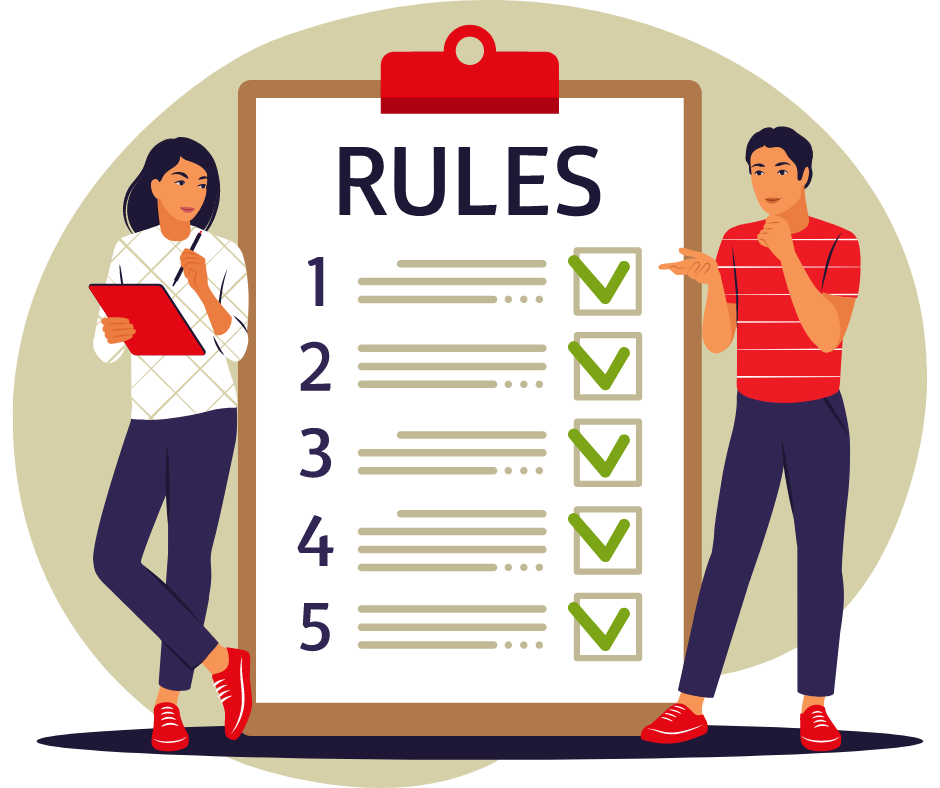Internal business rules are essential for defining the standards, procedures, and behaviors expected within a company. These rules help ensure consistency, efficiency, and accountability across the organization.
Here are some key internal business rules that can apply to most companies:
1. Code of Conduct
- Rule: Employees must adhere to the company’s ethical guidelines, which include honesty, integrity, and respect in all interactions.
- Purpose: To maintain professionalism and a positive work environment.
2. Confidentiality and Data Protection
- Rule: Employees must keep all company, client, and partner information confidential and adhere to data protection laws (such as GDPR, HIPAA, etc.).
- Purpose: To protect sensitive information and maintain trust with clients and stakeholders.
3. Attendance and Punctuality
- Rule: Employees must adhere to their work schedules, report on time, and notify their managers in case of absence or tardiness.
- Purpose: To ensure that business operations run smoothly and efficiently.
4. Workplace Harassment and Discrimination Policy
- Rule: The company has a zero-tolerance policy for harassment, discrimination, or any form of bullying based on race, gender, religion, or other protected characteristics.
- Purpose: To create a safe, inclusive, and respectful work environment.
5. Health and Safety Compliance
- Rule: Employees must follow all health and safety protocols, including the use of protective gear where necessary and reporting any safety hazards.
- Purpose: To ensure the safety and well-being of all employees in the workplace.
6. IT and Internet Usage Policy
- Rule: Employees must use company IT resources responsibly and avoid inappropriate internet usage or unauthorized software installations.
- Purpose: To protect company data, maintain cybersecurity, and prevent misuse of resources.
7. Performance and Productivity Standards
- Rule: Employees are expected to meet the productivity standards set by their role and contribute to team objectives.
- Purpose: To ensure consistent performance and achieve business goals efficiently.
8. Conflict of Interest
- Rule: Employees must disclose any potential conflicts of interest, such as personal business ventures or relationships that could affect their impartiality at work.
- Purpose: To maintain transparency and avoid decisions that could harm the company’s integrity.
9. Expense Reimbursement and Financial Policies
- Rule: Employees must follow the company’s expense reporting and approval process, including submitting valid receipts and adhering to company spending limits.
- Purpose: To ensure proper financial management and prevent misuse of company funds.
10. Reporting and Accountability
- Rule: Employees must regularly report on their work progress, and any incidents or issues should be immediately escalated to management.
- Purpose: To foster accountability, ensure continuous communication, and resolve issues promptly.
11. Dress Code in internal business rules
- Rule: Employees are expected to follow the company’s dress code, which may vary based on the industry (e.g., business casual, formal attire).
- Purpose: To maintain a professional image in line with the company’s branding and industry standards.
12. Remote Work and Flexibility Policy in Internal Business Rules
- Rule: Employees working remotely must adhere to the same performance standards as those in-office, remain available during work hours, and use company-approved tools for communication.
- Purpose: To maintain productivity and ensure seamless collaboration across remote and in-office teams.
13. Professional Development and Training
- Rule: Employees are encouraged to participate in ongoing training and development programs provided by the company to enhance their skills and knowledge.
- Purpose: To promote growth and ensure that employees remain competitive and competent in their roles.
14. Team Collaboration and Communication in Internal Business Rules
- Rule: Employees must collaborate respectfully and communicate openly with team members and management to ensure a cohesive and efficient work environment.
- Purpose: To enhance teamwork and avoid misunderstandings that can disrupt workflow.
15. Asset and Resource Management
- Rule: Employees must use company resources (equipment, office supplies, etc.) responsibly and report any damages or losses immediately.
- Purpose: To reduce waste, control costs, and maintain the longevity of company assets.
16. Leave and Vacation Policies in Internal Business Rules
- Rule: Employees must request leave or vacation time through the proper channels and follow the company’s guidelines for advance notice.
- Purpose: To ensure adequate workforce coverage and avoid disruptions in operations.
17. Innovation and Continuous Improvement
- Rule: Employees are encouraged to propose ideas for improving processes, products, or services that can enhance the company’s competitiveness.
- Purpose: To foster a culture of innovation and continuous growth.
18. Disciplinary Action and Grievances in Internal Business Rules
- Rule: Employees must follow the company’s grievance procedure for reporting issues or disputes, and disciplinary actions will be applied for violations of company policies.
- Purpose: To provide a clear framework for addressing conflicts and ensuring fairness in resolving issues.
Internal Business Rules
By implementing and enforcing these business rules, companies create an organized, ethical, and efficient work environment that aligns with their goals and values.








